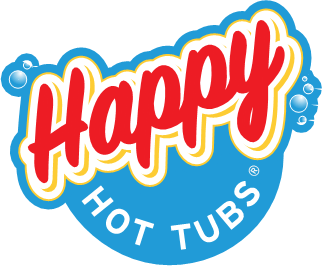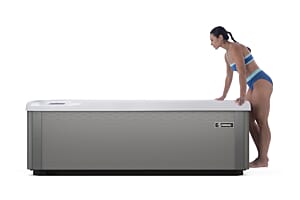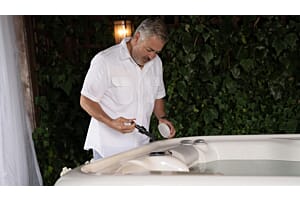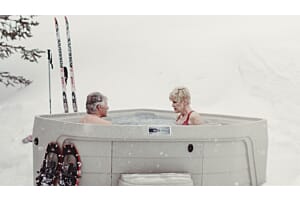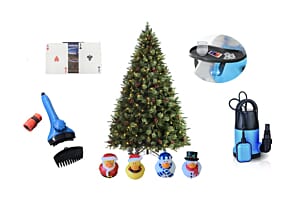Chlorine Granules Vs Chlorine Tablets

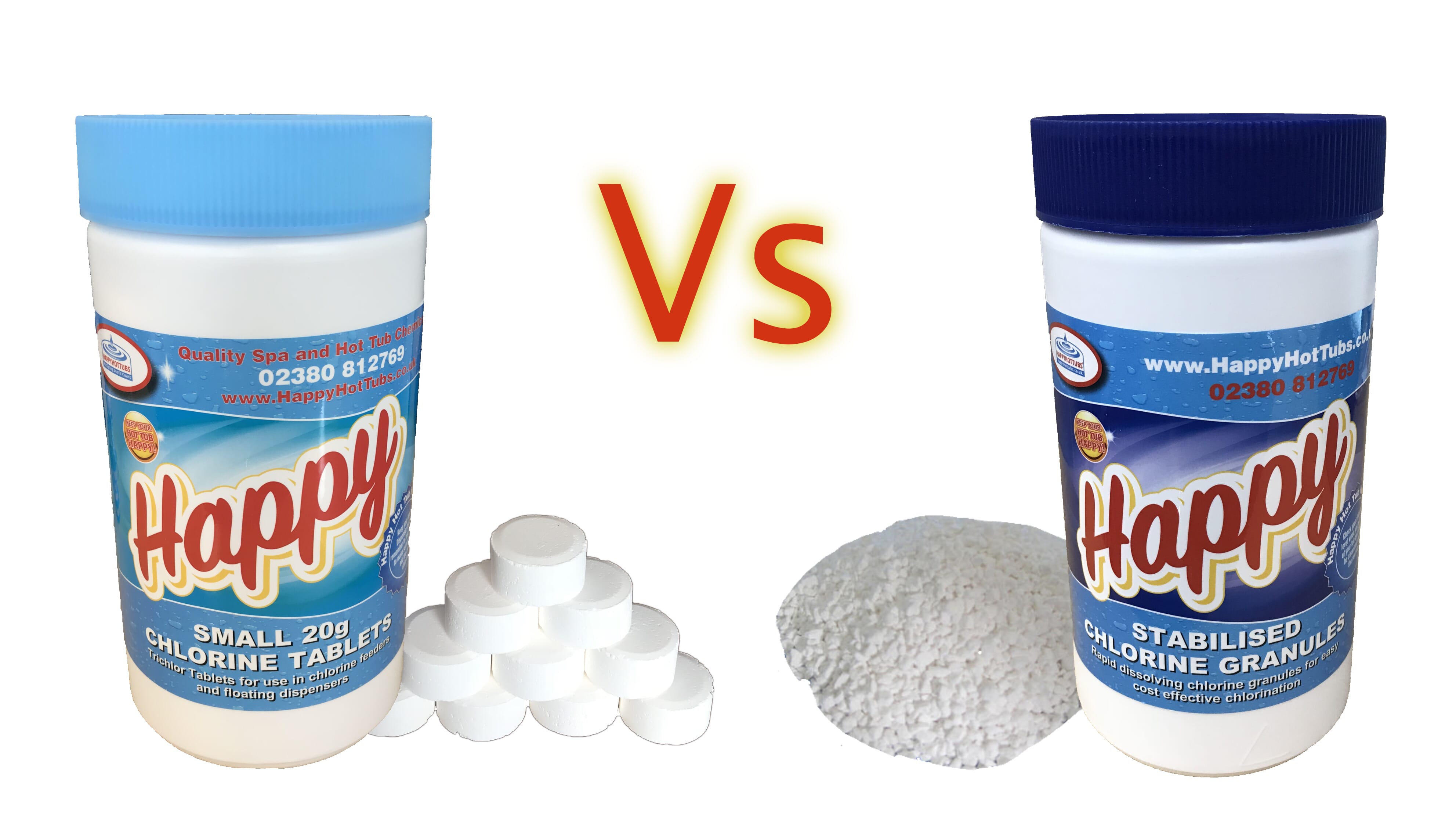
Chlorine is one of the main sanitisers used in hot tubs to kill bacteria, the other being Bromine. It would be hard to give exact figures of what percentage of UK hot tub owners use chlorine but at Happy Hot Tubs, we recommend chlorine as the default sanitiser to all new owners so we know that over 85% of our hot tub owners use chlorine. One of the most common questions we get asked is ‘Which is better for hot tubs, chlorine granules or chlorine tablets?’. Chlorine Granules are a powder form of chlorine (Sodium Dichlor) and they can be added directly to your hot tub water. Chlorine Tablets for hot tubs (Trichlor) are the size of a 50p piece and usually float in a dispenser or an in-line feeder.
In the below blog post, we will rank both granules and tablets out of 5 on the below factors and total up at the end to produce a winner.
- Cost
- Ease of Use
- Control of Bacteria
- Impact on Bathers
- Impact on Other Water Chemistry
Cost
There isn’t much in this one. The cost of chlorine granules has crept up more than chlorine tablets over the past couple of years but they are both very cost effective for the end user. A 1kg of Happy Hot Tubs Chlorine Granules is £13.99 vs £12.99 for a 1kg of Chlorine Tablets.
A score of 1 is very expensive and damaging on your wallet, whilst a score of 5 is very cost effective.
Chlorine Granules – 4
Chlorine Tablets – 5
Tablets pips granules on this one due to price increases on sodium dichlor in the past couple of years.
Ease of Use
Again, this one is close. Some will argue that chlorine tablets can save time as you simply fill a floating dispenser and leave this to float around – a sort of “set and forget” technique. Whilst there is some truth in this, it is also worth adding that it can be harder to boost levels with chlorine tablets. In fact users on chlorine tablets may find themselves boosting with chlorine granules when levels get low! From a control point of view, I feel as though chlorine granules offer more flexibility to the user as they can adjust dosing much more easily than adding more or less slow-dissolving tablets.
In this one a score of 1 is very difficult for the end user, a score of 5 is very easy.
Chlorine Granules – 4
Chlorine Tablets – 4
A draw! Some will argue one way, others will argue the other. I feel the added flexibility to boost levels with chlorine granules offers easier adjustment than chlorine tablets but this will be driven by personal preference/experience with your hot tub.
Control of Bacteria
Chlorine in general is an excellent controller of bacteria. It works quickly and effectively to keep your hot tub safe! Both chlorine tablets and chlorine granules are therefore very effective in killing bacteria. The key comment to make here is that all hot tub users must ensure their chlorine level is between 3-5ppm. If the levels do not stay between these parameters, bacteria may be able to grow in the water. The benefit of chlorine tablets is that the tablets slowly dissolve over time so therefore you have a supply of chlorine entering the water over a period. Chlorine granules however must be added so there is a higher risk that levels may drop if the hot tub is not attended to, adding risk of bacteria growth. On the flip side, the culture of ‘fill the dispenser and leave it’ does pose a risk that not enough chlorine is dissolved into the water and yet the user assumes it is ok. If this happens, bacteria may form without the user expecting it.
A score of 1 is very poor bacteria control, whereas a score of 5 is excellent bacteria control.
Chlorine Granules – 4
Chlorine Tablets – 4
Another draw! Both effective controllers of bacteria as they are both chlorine. The key here is to ensure you maintain your chlorine level at all times to prevent bacteria growth – don’t assume your dispenser will just do all the work without testing your water and make sure you add enough granules to keep up with the chlorine demand of the water.
Impact on Bathers
This factor is closely linked to the next factor – ‘impact of other water chemistry’. Chlorine tablets are acidic by nature, I mean it’s in the name – Trichloroisocyanuric acid. Sodium dichloroisocyanurate (Chlorine Granules) on the other hand is relatively neutral in terms of PH. This means that with the chlorine tablets slowly dissolving in your hot tub water, you are also reducing your PH and Alkalinity levels, which over time if not balanced properly can lead to itchy skin and eye sting for users (Read more about Alkalinity and PH here). For users of Chlorine Granules, the impact on PH is minimal so this is not a concern. The other risk with chlorine tablets is their existence in a dispenser or skimmer in your hot tub; you must ensure that this is removed when the hot tub is in use to stop people tampering with the tablets, as these can be harmful if not handled correctly. Again, with chlorine granules dissolving instantly in your hot tub water, this issue does not exist.
A score of 1 would be a very negative impact on bathers whereas a 5 would be a very positive impact on bathers.
Chlorine Granules – 4
Chlorine Tablets – 3
A win for the chlorine granules mainly due to the acidic nature of chlorine tablets and their physical presence in your hot tub at all times. Of course proper care and attention must be taken when handling all hot tub chemicals but we feel chlorine granules are friendlier to most hot tubbers!
Impact on Other Water Chemistry
As discussed above, chlorine tablets are acidic by nature and chlorine granules are relatively neutral in terms of PH. The effect that chlorine tablets have on your PH and Alkalinity really hits home when you find out that a lot of US hot tub manufacturers actually disspaprove of Chlorine Tablets from being used in their hot tubs and threaten to void warranty if they are used. The reason for this is that the risk of someone throwing 5-10 chlorine tablets in a dispenser and doing nothing else is very high and the impact on the hot tub components can be quiet severe as the PH will soon plummet to low levels. This won’t only affect bathers skin, eyes and hot tub components; there is also an impact on the efficiency of the chlorine in the hot tub. With PH being potentially very low as a result of the chlorine tablets, there is a risk that the chlorine cannot effectively kill bacteria, which could also put users at further risk.
A score of 1 would be a very negative impact on other water chemistry whereas a 5 would be a very positive impact on other water chemistry.
Chlorine Granules – 4
Chlorine Tablets – 3
These scores again highlight the impact of chlorine tablets on other aspects of your hot tub water chemistry. Chlorine granules are friendlier not only bathers but also to other aspects of your water chemistry.
The Verdict
The scores are in and we have a winner by a slim margin. Chlorine granules have come out on top with 20/25 from the 5 categories, with chlorine tablets achieving a score of 19. As mentioned above, it will almost always come down to personal preference as some hot tubbers like tablets, some prefer granules but either way as long as you are able to keep a chlorine level of 3-5ppm in your hot tub and well balanced PH/Total Alkalinity levels, you will be able to enjoy safe hot tubbing for many years to come.
